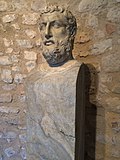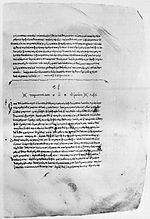 | Parmenides of Elea (/pɑːrˈmɛnɪdiːz ... ˈɛliə/; Greek: Παρμενίδης ὁ Ἐλεάτης; fl. late sixth or early fifth century BC) was a pre-Socratic Greek philosopher... 29 KB (3,565 words) - 01:09, 7 April 2024 |
Look up Parmenidés or Παρμενίδης in Wiktionary, the free dictionary. Parmenides was an ancient Greek philosopher born in Elea. Parmenides may also refer... 361 bytes (75 words) - 03:58, 19 March 2013 |
Caffrocrambus parmenides is a moth in the family Crambidae. It was described by Graziano Bassi in 1994. It is found in the Democratic Republic of the Congo... 971 bytes (57 words) - 08:35, 20 June 2021 |
 | Plato (section Heraclitus and Parmenides) decisively influenced by the pre-Socratic thinkers Pythagoras, Heraclitus, and Parmenides, although much of what is known about them is derived from Plato himself... 89 KB (9,017 words) - 07:32, 25 April 2024 |
Nothing (section Parmenides) Socrates and Plato largely agreed with Parmenides's reasoning on nothing. Aristotle differs with Parmenides's conception of nothing and says, "Although... 21 KB (2,863 words) - 13:27, 26 April 2024 |
 | c. 430 BC) was a pre-Socratic Greek philosopher. He was a student of Parmenides and one of the Eleatics. Born in Elea, Zeno defended his instructor's... 24 KB (3,045 words) - 18:26, 26 December 2023 |
representations of itself in particular objects. For example, in the dialogue Parmenides, Socrates states: "Nor, again, if a person were to show that all is one... 38 KB (5,094 words) - 22:51, 24 April 2024 |
Nothing comes from nothing (section Parmenides) Latin: ex nihilo nihil fit) is a philosophical dictum first argued by Parmenides. It is associated with ancient Greek cosmology, such as is presented not... 7 KB (904 words) - 17:02, 12 January 2024 |
Simplicius of Cilicia. Zeno devised these paradoxes to support his teacher Parmenides's philosophy of monism, which posits that despite our sensory experiences... 44 KB (4,787 words) - 03:39, 19 April 2024 |

